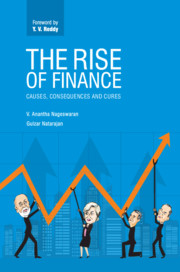1 - Introduction
from Part A - The Causes
Published online by Cambridge University Press: 02 May 2019
Summary
In 2015, ethicist Dirk Philipsen wrote a book on GDP – gross domestic product. The book was titled The Little Big Number: How GDP Came to Rule the World and What to do About it. Katy Lederer, who reviewed the book for the New Yorker, quotes this gem from the book:
… a pill-dependent smoker who, on the way to his divorce lawyer, crashes his oversized car into a school bus because he is texting about an impending derivatives trade.
Philipsen has used this extreme example to make the point that GDP makes no distinction between ethical and unethical activities. All of the above boost GDP but do little to boost economic welfare or well-being. Yes, it includes the derivatives trade.
A piece of news from Financial Times in June 2018 proved that Philipsen was not exaggerating. A financial market trader, running a hedge fund inside the private equity firm Blackstone, used to take positions in credit default swaps (CDSs) (an insurance contract that compensates the owner if the borrower defaults on payments – interest and/or principal repayment – on the bond on which the insurance was bought). Nothing exceptional. Hedge fund managers and traders routinely do this. The difference was that he then used it to lean on the companies that had to make the payment to miss payments or delay them such that they constituted a technical default. His CDSs would then pay him out the compensation. Few days later, the companies would make their delayed payments to bondholders. In one of his last trades, he did the opposite. He sold CDSs to other hedge funds on a company that looked very likely to default on its next payment and collected premiums from those who bought the CDS. Then, the company was lent enough money such that it did not default on the payment. The insurance was for nothing. Those who bought the CDS lost their premiums! Several months later, the company defaulted and filed for bankruptcy. This is the equivalent of fixing matches in sports. We are also reminded of Almighty, a novel by fiction writer Irving Wallace, in which a newspaper owner would begin to create news-stories and make them happen so that his newspaper could be the first one to report the exclusive breaking news!
- Type
- Chapter
- Information
- The Rise of FinanceCauses, Consequences and Cures, pp. 3 - 17Publisher: Cambridge University PressPrint publication year: 2019



